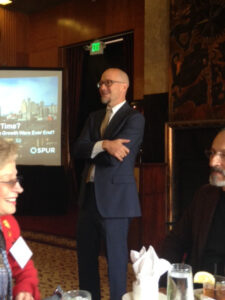Berkeley Daily Planet, May 22, 2022
Shortly after midnight on May 11, the Berkeley City Council took another ideologically driven, data-challenged action and voted 8-1 to approve a disputed conceptual design for adding two side-by-side bike lanes on the south side of Hopkins Street from Sutter in the east to Gilman in the west when the street is repaved in summer 2023.
The approved design generally reflects the final recommendations of the Hopkins Corridor Traffic and Placemaking Study that evolved in the course of eight online public meetings and Transportation Department staff “outreach” to “stakeholders” between 2020 and 2022. The study was initiated by a January 2018 referral to city staff from District 5 Councilmember Sophie Hahn.
According to Creative Crosswalks, adding the bike lanes will require the narrowing or eliminating auto lanes, removing an unspecified number of parking spaces, and eliminating a bus stop. Other changes include raised pedestrian crosswalks, bulb-outs (sidewalk extensions) and bus boarding islands.
A supplemental proposal authored by Hahn and Mayor Arreguín added some amendments to the Study’s recommendations, including the removal of the widely despised bicycle infrastructure at the Hopkins-Alameda intersection; extending the two-way parking-protected bike lanes along the entire south side of Hopkins east of The Alameda; establishing Residential Preferred Parking both on and/or surrounding Hopkins; and widening the proposed bike lanes from 4 feet to a minimum of 4.5 or 5 feet each wherever possible by narrowing traffic lanes, without eliminating additional parking.
In response to a supplemental proposal from District 1 Councilmember Rashi Kesarwani, Hahn and Arreguin also asked staff to study extending the bike lanes to San Pablo. In response to an amendment suggested by Wengraf, the council asked staff to study adding a traffic signal at Hopkins-Monterey intersection. Also approved was Hahn’s request that the city’s Office of Economic Development be engaged to address the concerns of the businesses on Hopkins. Continue reading





